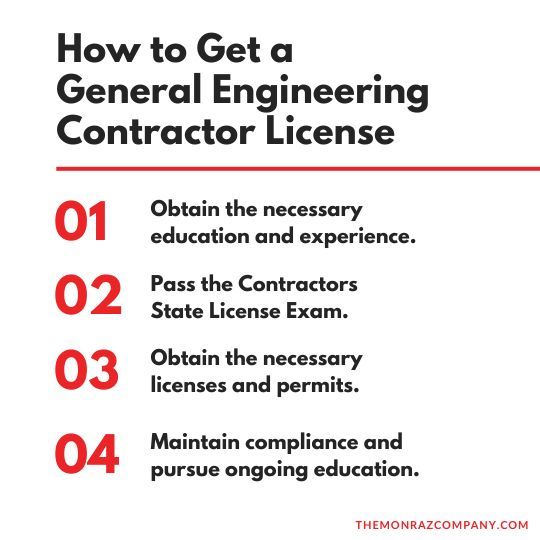What Is A General Engineering Contractor?: All You Need To Know
The construction industry is a thriving and dynamic field that offers a wealth of opportunities for those with the right skills and expertise. One such career path that has been gaining increasing attention is that of the general engineering contractor. These professionals play a crucial role in shaping the infrastructure and built environment that we rely on every day.
In this comprehensive guide, we'll look into the world of general engineering contractors. We’ll look at what they do, the requirements to become one, and how you can embark on this rewarding career.
If you have repair and construction questions needing expert answers, call the experts at TMC Engineering! If you're in Southern California, we can instruct you on your problem and perform whatever repair is necessary. We've got an expert solution for all your asphalt or concrete needs!

What Is A General Engineering Contractor?
A general engineering contractor is a specialized professional who oversees the construction of a wide range of "fixed works" projects, including roads, utility plants, water supply systems, disposal plants, bridges, and other infrastructure-related undertakings. Unlike general contractors who focus on vertical construction such as buildings, general engineering contractors specialize in horizontal construction projects that require a deep understanding of engineering principles and techniques.
These contractors are responsible for the planning, management, and execution of complex engineering works, ensuring that projects are completed on time, within budget, and in compliance with all relevant building codes and safety regulations. They possess the knowledge and skills necessary to handle projects that involve excavating, grading, trenching, and the installation of various utility systems.

What Does A General Engineering Contractor Do?
As a general engineering contractor, your responsibilities will encompass a diverse range of tasks and activities. Let's explore some of the key duties and responsibilities of this role:
Project Management
One of the primary responsibilities of a general engineering contractor is effective project management. This involves overseeing the entire lifecycle of a construction project, from the initial planning and design stages to the final completion and handover. This includes coordinating with various stakeholders, such as engineers, architects, and subcontractors, to ensure the seamless execution of the project.
Compliance and Regulatory Oversight
General engineering contractors must have a deep understanding of local, state, and federal building codes, as well as relevant environmental regulations. They are responsible for ensuring that all construction activities adhere to these guidelines, protecting the safety of workers and the integrity of the project.
Site Preparation and Infrastructure Development
General engineering contractors are responsible for the preparation and development of construction sites, which can involve activities such as excavation, grading, trenching, and the installation of utility systems like water, sewer, and electrical infrastructure.
Subcontractor Management
In many construction projects, general engineering contractors work with a team of specialized subcontractors, such as electricians, plumbers, and heavy equipment operators. Managing and coordinating the work of these subcontractors is a crucial aspect of the job, ensuring that the project is completed efficiently and to the required standards.
Quality Control and Assurance
Maintaining high-quality standards is essential for general engineering contractors. They are responsible for implementing rigorous quality control measures throughout the construction process, ensuring that the final product meets or exceeds the specified requirements and design specifications.
Safety Oversight
The safety of workers and the public is of paramount importance in the construction industry. General engineering contractors are responsible for developing and implementing comprehensive safety protocols, providing necessary training, and ensuring compliance with all relevant occupational health and safety regulations.

How to Get a General Engineering Contractor License
Becoming a licensed general engineering contractor requires a comprehensive and structured approach. Here are the typical steps involved:
Step 1: Obtain the necessary education and experience.
Most states require general engineering contractors to have a minimum of four years of experience in the construction industry, coupled with a bachelor's degree in civil engineering, construction management, or a related field. This ensures that they possess the technical expertise and practical knowledge required for the job.
Step 2: Pass the Contractors State License Exam.
Aspiring general engineering contractors must pass a comprehensive licensing exam administered by the Contractors State License Board (CSLB) or a similar state regulatory body. This exam tests their knowledge of construction practices, building codes, project management, and legal and financial aspects of the industry.
Step 3: Obtain the necessary licenses and permits
In addition to the general engineering contractor license, individuals may also need to obtain various other licenses and permits, depending on the specific requirements of the state or local jurisdiction. This can include licenses for specific trades, such as electrical or plumbing work, as well as business licenses and permits.
Step 4: Maintain compliance and pursue ongoing education
Once licensed, general engineering contractors must continuously stay up-to-date with industry developments, changes in regulations, and best practices. This may involve completing ongoing training, attending industry events, and staying informed about the latest advancements in construction technology and techniques.
General Engineering Contractor Requirements
To become a successful general engineering contractor, you'll need to possess the following key requirements:
- Extensive experience in the construction industry, with a focus on civil engineering projects
- A bachelor's degree in civil engineering, construction management, or a related field
- A comprehensive understanding of building codes, safety regulations, and environmental compliance
- Strong project management and problem-solving skills
- Excellent communication and interpersonal skills to coordinate with various stakeholders
- Financial management and business acumen to oversee the financial aspects of construction projects
- Familiarity with the latest construction technologies and techniques
Remember, the requirements for becoming a general engineering contractor may vary depending on the state or local jurisdiction. It's essential to research and comply with the specific regulations in the area where you plan to operate your contracting business.
If you're interested in learning more about responsibilities related to infrastructure maintenance, such as “Who is Responsible for Sidewalk Repair?”, we encourage you to check out our previous posts on such topics on our blog.
A General Engineering Contractor bridges the gap between engineering vision and real-world infrastructure.
General engineering contractors play a vital role in shaping the built environment, from the roads and bridges we rely on to the complex utility systems that power our communities. By possessing the necessary education, experience, and technical expertise, these professionals are positioned to lead the construction industry forward, delivering high-quality projects that enhance the quality of life for all
Whether you're an aspiring construction professional or an experienced operator in the field, understanding the role and requirements of a general engineering contractor can open up a world of opportunities. Take the time to explore the educational and licensing pathways, and consider how your skills and interests might align with this rewarding career path.
At TMC Engineering , we have a deep commitment to delivering projects characterized by the highest standards for safety, workmanship, and client satisfaction. We aim to provide you with valuable content and insights related to the services our team of experts provides!
Whether you require asphalt paving, striping, sealing, or concrete work, we offer a full suite of transportation construction solutions. Look no further we’ve got all you need and more!




